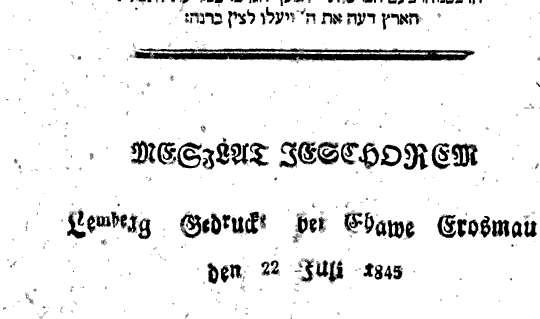On the HUC-JIR Library blog Needle in the Bookstacks, Phil Miller submitted a post called Is Jozefów Close to Chelm?.
He was taking a look at the 1835 edition of Ramchal's Mesilas Yesharim published in Jozefów and he noticed what first appeared to be gibberish in Latin letters on the title page: MYRUZSJ SEŁYSM. It took a minute, but he realized that the type had been set from right to left (like Hebrew) and should have read MSYŁES JSZURYM, that is, Mesilas Yesharim (in Polish). Why? Who knows. Maybe the typesetter was so immersed in right-to-left mode that he just made a mistake, or conceivably he didn't even realize that Polish is written from left-to-right.

By way of comparison, here are some other editions from a similar time period:
Warsaw 1841:

Lemberg 1845:


.gnisuma yrev saw tahT
ReplyDelete-- lihP
MSYŁES JSZURYM, that is, Mesilas Yesharim (in Polish)
ReplyDeleteAnd Mesilas Yesharim is what? Pre-Ashkenazic or Artscrollese?
Heh. Better than the 1988 Al Leiter card.
ReplyDeleteDF
You mean Billy Ripken? ;-)
ReplyDeleteThat same typesetter made another mistake as well: The "el bar" (letter L with a bar through it)
ReplyDeletein Polish is pronounced like a W in English.
Still, maybe with mesilla = track or path,
and yashar = righteous or straight, there is is so much straightness that he just had to go from right to left --- his sense of humor made him do it.
No mistake here. In older Polish, and in fact still in some dialects, it was a "dark l" (same as in American English, or in England after a vowel). This was the default for transcriptions from other languages, (only) sometimes depending on the vowel after it.
ReplyDelete